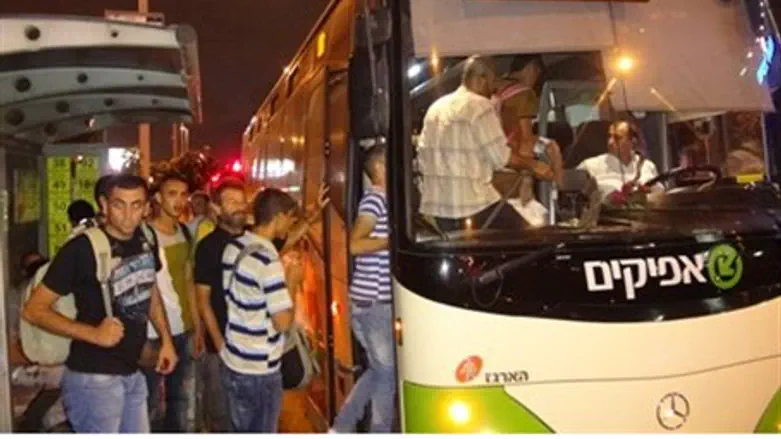
After Prime Minister Binyamin Netanyahu announced Wednesday that he was suspending a plan that would prevent Palestinian Arab workers from riding the same buses as Jews in Judea and Samaria, an IDF officer reported that he had been “attacked” and “humiliated” by Arab workers on one such line.
The incident occurred on the bus line to Ariel, the officer reported on his Facebook page. “I was alone on the bus except for four workers, and I sat far away from them, realizing my IDF uniform and decorations would not win me friendship among them.”
“When my stop came, I got up and proceeded to the exit, where I tripped on the foot of one of the Arabs. I couldn't help but fall and trip."
“In my naivete, I thought the incident was a mere accident – until I saw them giggling at my expense. Then I noticed that one of them had been filming it, meaning that this had been planned in advance,” the officer wrote.
“I got off the bus angry and humiliated – but I realized that the incident could have ended far differently,” he added.
On Wednesday, the Prime Minister's office said that proposal to ban Arab workers from the buses “is unacceptable to the prime minister. He spoke with the defense minister this morning and it was decided that the proposal will be frozen.”
Earlier Wednesday, left-wing MKs reacted furiously to the measures, approved by Defense Minister Moshe Yaalon after campaigning by some Judea-Samaria residents who complained of frequent harassment by Palestinian workers.
The decision, two years ago, to allow Arabs on the buses that served Jews had "created a situation in which tens of thousands of Palestinian laborers, including thousands of illegal infiltrators, filled the bus lines, and made it impossible for the residents of Judea and Samaria communities who require public transport to return to their homes," according to Jewish Home MK Moti Yogev, who hailed Yaalon's decision.
The policy also brought about a situation rife with sexual harassment, theft, and a feeling of insecurity, charged Yogev – and mostly, great overcrowding that made it impossible for people to travel to and from their homes.